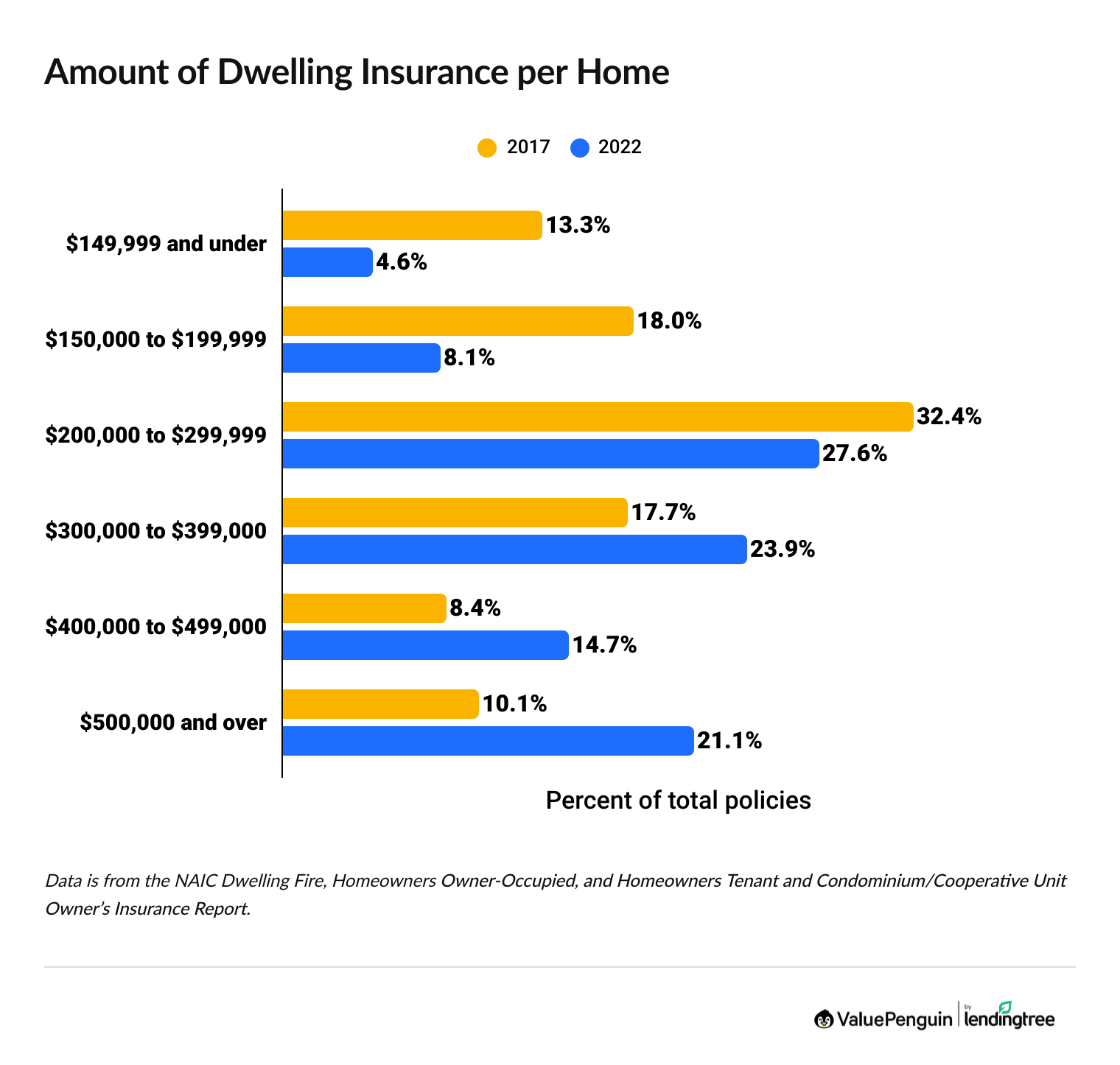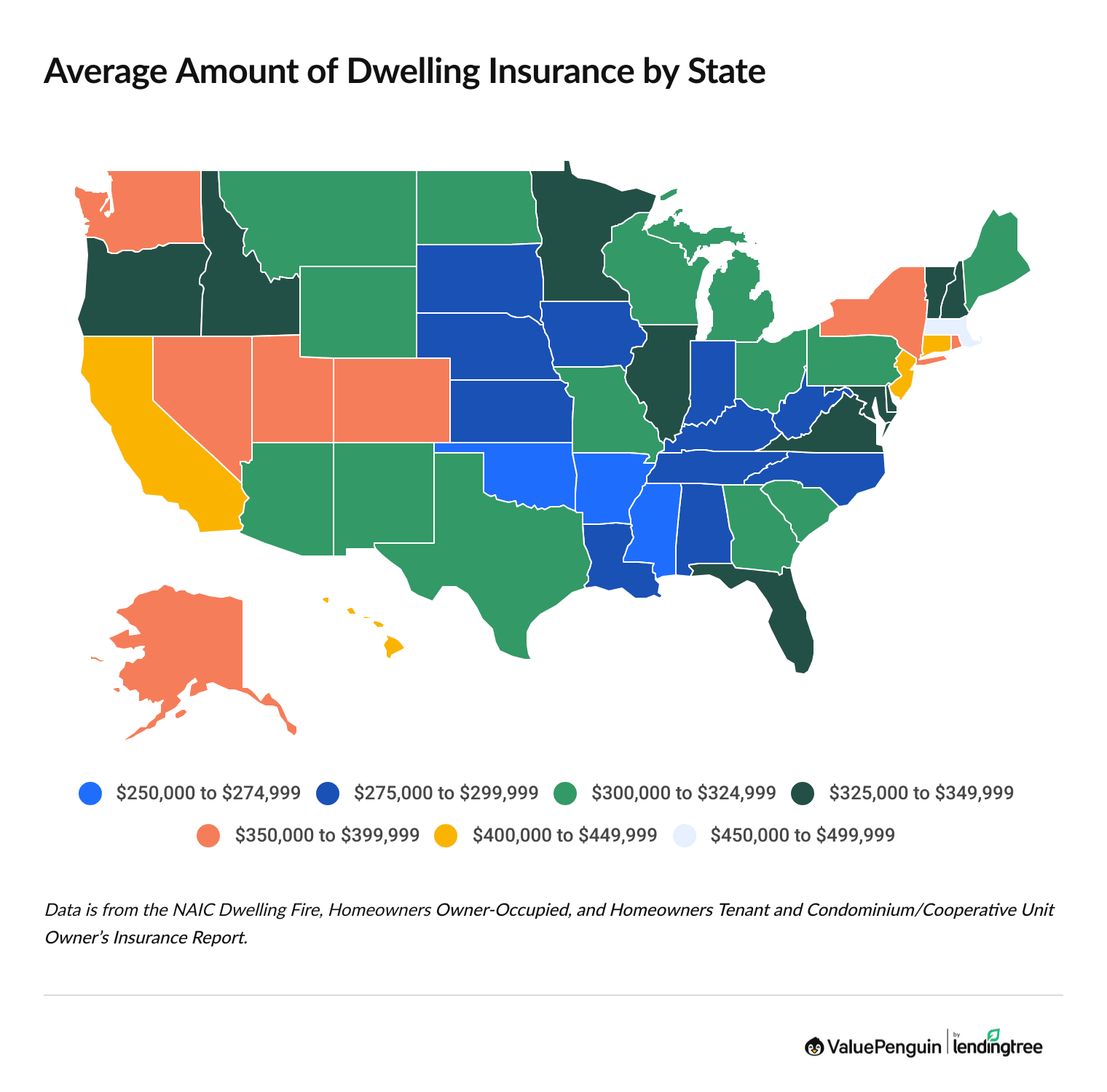Home Insurance Facts and Statistics: Cost, Coverage & Claims
Home insurance companies have raised rates by an average of 48% over the past five years.
The number of home insurance claims has also gone up. Homeowners filed 18% more claims in 2023 than in 2019. This jump in claims is making it more expensive for insurance companies to protect homes, which is one reason rates are also going up.
In addition, higher material costs mean homeowners need higher coverage limits than they have in the past, which also makes policies more expensive.
Home insurance facts
Find Cheap Homeowners Insurance Quotes in Your Area
Trends in the average cost of home insurance
The average cost of homeowners insurance is $2,151 per year in the U.S.
Homeowners insurance rates have gone up by an average of 48% in the past five years.
However, rates increased by more in some states than others. Colorado homeowners saw the greatest rate hikes, at around 91% between 2020 and 2025. Wyoming had the smallest increase, at just 1%.

Find Cheap Auto Insurance Quotes in Your Area
Increase in average home insurance cost by state
Property insurance coverage trends
The amount of home insurance coverage people are buying has also increased.
In 2017, homeowners insurance policies with between $200,000 and $299,999 of dwelling coverage were the most common, representing close to a third of all policies. By 2022, only around one-quarter of homes had that level of coverage.
In comparison, the percentage of homes with $300,000 to $399,000 of dwelling coverage increased from 17.7% to 23.9% over that same time period. And the number of homes with $500,000 to $599,000 nearly doubled.

Amount of dwelling insurance per policy, 2017–2022
Dwelling amount | 2017 | 2022 | % change |
|---|---|---|---|
| $149,999 and under | 13.3% | 4.6% | -65% |
| $150,000 to $199,999 | 18.0% | 8.1% | -55% |
| $200,000 to $299,999 | 32.4% | 27.6% | -15% |
| $300,000 to $399,000 | 17.7% | 23.9% | 35% |
| $400,000 to $499,000 | 8.4% | 14.7% | 75% |
| $500,000 and over | 10.1% | 21.1% | 109% |
Home insurance coverage trends by state
Massachusetts homeowners tend to have the highest home insurance coverage limits in the country.
Home insurance policies in Massachusetts have an average of $450,000 to $499,999 of dwelling coverage, which protects the structure of your home.
Homes in Arkansas, Mississippi and Oklahoma typically have the least protection, at $250,000 to $274,999 of dwelling coverage.

Average dwelling insurance coverage by state
State | Most common dwelling coverage |
|---|---|
| Alabama | $275,000 to $299,999 |
| Alaska | $350,000 to $399,999 |
| Arizona | $300,000 to $324,999 |
| Arkansas | $250,000 to $274,999 |
| California | $400,000 to $449,999 |
Household insurance claims statistics
Wind causes most home insurance claims in the U.S.
In 2023, homeowners filed more than 1.7 million wind claims — 32.6% of the total claims filed that year.
Water damage caused by burst pipes, leaky fixtures and appliances and broken sump pumps is the second most common cause for home insurance claims. There were more than 1 million claims filed for water damage not caused by weather in 2023.

Damage type | Number of claims | % of total claims |
|---|---|---|
| Wind damage | 1,720,000 | 32.6% |
| Water damage, non-weather | 1,060,000 | 20.1% |
| Hail damage | 820,000 | 15.5% |
| Theft damage | 193,030 | 3.7% |
| Fire damage, non-weather | 133,490 | 2.5% |
| Water damage, weather | 50,000 | 0.9% |
| Fire damage, weather | 5,270 | 0.1% |
Most common home insurance claims by state
While wind damage is the most common home insurance claim nationally, it's not the most prevalent in every state.
For example, states in the Midwest and Tornado Alley tend to have more hail claims. Western states experience more damage from burst pipes and leaky fixtures.
Colorado had the highest overall loss cost from wildfire and flood claims, also known as catastrophe claims, in 2023. But Hawaii had the highest cost per claim, likely due to the damage from the 2023 Lahaina wildfires.

State | Claim type |
|---|---|
| Alabama | Wind |
| Alaska | Fire & lightning |
| Arizona | Water, non-weather |
| Arkansas | Hail |
| California | Water, non-weather |
Wind damage claims statistics
Severe weather events, such as hurricanes and tropical storms, made up 62% of wind-related insurance claims in 2023, according to LexisNexis.
That's 10% more than in 2022, when catastrophic weather caused 52% of wind claims.
This is partially because there were 20 named storms in 2023, including Hurricane Lee and Hurricane Idalia. This is much higher than the average of 14 storms per year.
In March of 2023, severe weather in the southeastern U.S. caused an additional $6 billion in damage, some of which was attributed to wind.
Number of home insurance claims due to wind damage
Year | Number of claims |
|---|---|
| 2023 | 1.72M |
| 2022 | 1.45M |
| 2021 | 1.36M |
| 2020 | 1.75M |
| 2019 | 1.2M |
Florida, Iowa, Kentucky, Louisiana and Maryland had the highest wind damage costs in 2023. Alaska, California, Nevada, Oregon and Vermont had the least costly wind damage.
Water damage claims statistics
There are two types of water damage insurance will pay to repair.
- Flooding caused by weather, such as storm surge or rising waters from rain
- Non-weather damage, such as burst pipes, a leaky toilet or a hot water heater.
The majority of water claims aren't caused by weather. In 2023, burst pipes and leaky appliances made up 20.1% of home insurance claims. The cost of these claims decreased by 11.2% from 2022 to 2023.
Arizona, California, Nevada, Rhode Island and Washington had the most expensive non-weather water claims in the country.
Number of homeowners water damage claims
Year | Weather | Non-weather | Total |
|---|---|---|---|
| 2023 | 50K | 1.06M | 1.11M |
| 2022 | 50K | 1.07M | 1.12M |
| 2021 | 110K | 1.09M | 1.2M |
| 2020 | 40K | 1.03M | 1.07M |
| 2019 | 40K | 99K | 1.03M |
Weather-related flooding accounted for less than 1% of all home insurance claims in 2023. Flood claims also saw a reduction in cost, down 51.4% from 2022 to 2023.
Connecticut, Illinois, Maryland, Rhode Island and Texas are the most expensive states for weather-related flood claims.
In 2023, severe weather caused 61% of weather-related flood claims. Many parts of the country experienced major flooding in 2023, from heavy rainfall in California early in the year to historic flooding in Vermont in July.
Theft home insurance claims statistics
Theft accounts for 3.7% of all home insurance claims nationwide.
The total number of theft claims went down by 15.8% from 2022 to 2023. In addition, the cost of those claims decreased by 14.2% year over year.
Although the overall cost of theft claims went down, the amount of each individual claim went up by 1.9% between 2022 and 2023. This is likely due to the continued rise in the cost of household items, which makes them more expensive for insurance companies to replace after theft.
Number of home insurance theft claims
Year | Number of claims |
|---|---|
| 2023 | 193,030 |
| 2022 | 216,600 |
| 2021 | 197,860 |
| 2020 | 224,040 |
| 2019 | 223,360 |
Alaska, California, Nevada, Washington and Washington, D.C., are the most expensive states for theft claims in the country. On the other hand, Florida, Maine, Vermont, West Virginia and Wyoming have the lowest theft claim costs.
Fire damage claims statistics
Fires made up 2.6% of all home insurance claims in 2023.
Only 10% of fire claims were caused by weather, such as lightning or wildfires. This is despite the catastrophic Lahaina wildfires in Hawaii, which caused an estimated $5.6 billion in total damage in August, 2023.
Number of fire claims
Year | Ligtning | Non-weather | Total |
|---|---|---|---|
| 2023 | 5,270 | 133,490 | 138,760 |
| 2022 | 4,180 | 147,050 | 151,240 |
| 2021 | 4,760 | 138,050 | 142,820 |
| 2020 | 13,530 | 148,180 | 161,710 |
| 2019 | 6,090 | 135,990 | 142,080 |
The majority of fire damage takes place in June, July and August. The hot, dry weather makes summer months more susceptible to wildfires. In addition, the use of outdoor grills, fire pits and fireworks can all increase the chances of house fires.
Hawaii, Alaska, California, Colorado and Washington, D.C., had the most expensive fire claims in 2023.
Hail damage claims statistics
Hail claims accounted for 15.5% of the total home insurance claims in the U.S. in 2023.
The total cost of hail claims increased by 57.9% from 2022 to 2023. This is because of an increase in both the frequency of claims and the cost of damage per claim.
There were 6,962 hailstorms in the U.S. in 2023, up from 4,436 the year before. Of the 28 billion-dollar weather disasters that year, 17 involved severe storms or hail.
Number of home insurance claims for hail damage
Year | Number of claims |
|---|---|
| 2023 | 820K |
| 2022 | 550K |
| 2021 | 490K |
| 2020 | 580K |
| 2019 | 530K |
Colorado, Iowa, Minnesota, Nebraska and South Dakota were the five states with the highest costs of hail claims in 2023.
Largest homeowners insurance companies
State Farm is the by far largest home insurance company in the country.
It writes around 18.2% of all home insurance policies in the U.S. That's twice as many as the second-largest company, Allstate.
While there are many homeowners insurance companies in the U.S., the 20 largest companies write nearly three-quarters of the home insurance policies across the country.
20 largest home insurance companies in the U.S.
Company | Market share | Direct premiums (billions) |
|---|---|---|
| State Farm | 18.2% | 31.46 |
| Allstate | 9.0% | 15.49 |
| USAA | 6.9% | 11.90 |
| Liberty Mutual | 6.1% | 10.61 |
| Farmers | 5.5% | 9.51 |
Methodology
To find the average cost of home insurance in the U.S., ValuePenguin editors gathered rates from the largest companies in every state for every residential ZIP code in the country.
Rates are for a 45-year-old married man with no prior home insurance claims and a good credit score. Policy includes $350,000 of dwelling coverage, $100,000 of personal liability coverage, $5,000 of medical payments coverage and a $1,000 deductible.
ValuePenguin's analysis used insurance rate data from Quadrant Information Services. These rates were publicly sourced from insurer filings and should be used for comparative purposes only. Your own quotes will likely be different.
Sources
- Condominium/Cooperative Unit Owner’s Insurance Report: Data for 2022">NAIC Dwelling Fire, Homeowners Owner-Occupied, and Homeowners Tenant and
- Condominium/Cooperative Unit Owner’s Insurance Report: Data for 2022
- Verisk ClaimSearch Trends 2023 Year-end Report
- 2024 LexisNexis U.S. Home Trends Report
- S&P Global: RateWatch
Editorial Note: The content of this article is based on the author's opinions and recommendations alone. It has not been previewed, commissioned or otherwise endorsed by any of our network partners.
